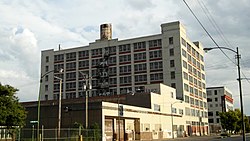Larkin Company Building
| Larkin Company Building | |
|---|---|
 | |
 | |
| General information | |
| Architectural style | Classical Revival[1] |
| Location | 3617 S. Ashland Avenue, Chicago, Illinois |
| Coordinates | 41°49′40.6″N 87°39′53.5″W / 41.827944°N 87.664861°W |
| Completed | 1912 |
| Demolished | December 2020 |
| Technical details | |
| Floor count | 8 |
| Design and construction | |
| Architect(s) | F. E. Lockwood |
The Larkin Company Building was an eight-story loft building at 3617 S. Ashland Avenue in Chicago's Central Manufacturing District. It was a contributing property to the Central Manufacturing District–Original East Historic District.[1] The building was constructed in 1912 and was demolished in December 2020.
History
[edit]
The Larkin Company purchased the property in late 1911 for $45,257 and built the building in 1912 at a cost of approximately $500,000.[2][3][4][5] It was designed by F. E. Lockwood and originally housed the Larkin Company's Chicago operations.[1][3][5] It also housed the offices and warehouse of the Vassar Swiss Underwear Company from 1913 until 1914, when it moved to its newly built plant at 2545 West Diversey.[6][7] In the 1920s, the building housed the Midwestern operations of the Hydro-United Tire Company and the Bristol Company, a manufacturer of recording equipment.[8][9]
By the early 1930s, Jewel Food Stores had offices in the building.[10] The Jewel Tea company purchased the building in 1937 for $432,000.[11] The building served the headquarters of the Jewel Food Stores division, as well as its warehouse.[12][13] A two-story addition was built in 1948, designed by Carr & Wright.[12] In 1954, much of the company's Chicago and Barrington operations were combined at their new site in Melrose Park, but the building continued to serve Jewel as a distribution warehouse for many years.[14][15] In 1954, Jewel planned to build a heliport on the roof of the building.[16] The building later housed Wm. Wrigley Jr. Company's Wrico Packaging division.[17] A permit to demolish the building was issued on December 11, 2020.
References
[edit]- ^ a b c "National Register of Historic Places Registration Form: The Central Manufacturing District: Original East Historic District" (PDF). National Park Service. December 21, 2015. p. 9. Retrieved December 21, 2020.
- ^ The Economist. January 13, 1912. p. 151. Retrieved December 21, 2020.
- ^ a b "Larkin Plant Coming: Big Buffalo Firm Gets Tract on Ashland Avenue, Between Thirty-sixth and Thirty-seventh", Chicago Tribune. November 25, 1911. p. 13.
- ^ "Larkin Company Buys Site", Chicago Tribune. November 26, 1911. p. 6.
- ^ a b The Economist. April 27, 1912. p. 852. Retrieved December 21, 2020.
- ^ "Chicago", The Clothier and Furnisher. May 1913. p. 87. Retrieved December 21, 2020.
- ^ "Knitting Mill News", Textile World Record. April 1914. p. 169. Retrieved December 21, 2020.
- ^ "Trade Gossip", Motor Record. July 1922. p. 17. Retrieved December 21, 2020.
- ^ "Trade Notes", Ice and Refrigeration. May 1924. p. 512. Retrieved December 21, 2020.
- ^ "2 Chain Stores to Take School Tax Warrants", Chicago Tribune. March 26, 1933. p. 6.
- ^ "Jewel Tea Pays $432,000 in Cash For Warehouse", Chicago Tribune. May 16, 1937 Part 5, p. 18.
- ^ a b "Start Work on Addition to Building", Chicago Tribune. August 1, 1948. Part 3, p. A.
- ^ Block, Daniel R.; Rosing, Howard B. (2015). Chicago: A Food Biography. Rowman & Littlefield. p. 112. Retrieved December 21, 2020.
- ^ Chase, Al. "Jewel to Build Big Project in Melrose Park: Warehouse-Office Cost Is 4 Millions", Chicago Tribune. July 24, 1953. p. 7F.
- ^ "Hails 35 Years For Donnelley as Compositor", Chicago Tribune. November 8, 1964. Section 10, p. 4.
- ^ "Copter Bought by Jewel Tea To Link Units", Chicago Tribune. May 30, 1954. p. 7.
- ^ Edgar, Susan E. (1996). Ward's Business Directory. p. 179.
